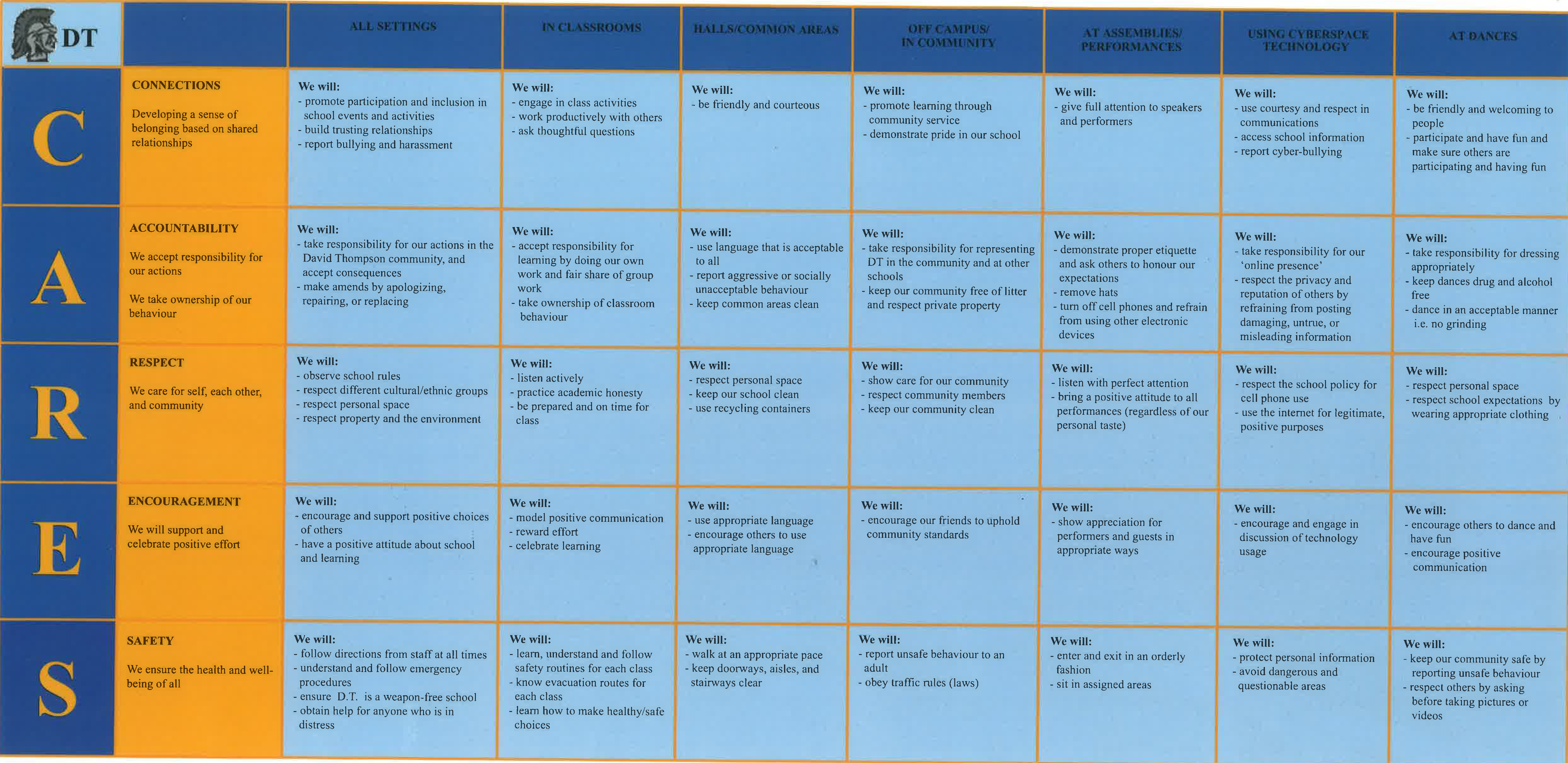Code of Conduct
Code of Conduct - Updated June 2024
David Thompson Cares - Statement of Purpose
The purpose of our code of conduct is to establish and maintain safe, caring, and orderly environments for purposeful learning and student success. Our code is built around the ideals of Connection, Accountability, Respect, Encouragement, and Safety, which represent (reflect) the values of our school community. Racism will not be tolerated in our school.
The School Code of Conduct applies at school, during school-organized or sponsored activities, on school buses, and any behaviour even if outside of school or school hours, (including on-line behaviour), that negatively impacts the safe, caring, or orderly environment of the school, and/or student learning.
Relationship to BC Human Rights Code
David Thompson school promotes the values expressed in the BC Human Rights Code respecting the rights of all individuals in accordance with the law - prohibiting discrimination based on race, colour, ancestry, place of origin, religion, marital status, family status, physical or mental disability, sex or sexual orientation, or gender identity or expression - in respect of discriminatory publication and discrimination in accommodation, service, and facility in the school environment.
Application of Code of Conduct - Conduct Expectations
Acceptable Behaviour
These expectations apply to behaviour at school, during school-organized or sponsored activities, and behaviour beyond these times (including on-line behaviour that negatively impacts the safe, caring or orderly environment of the school, and/or student learning.
Unacceptable Conduct
Students shall not discriminate against others on the basis of Indigenous identity, race, religion, colour, ancestry, place of origin, marital status, family status, age, sex or sexual orientation, gender identity/expression, or physical or mental disability, or for any other reason set out in the Human Rights Code of British Columbia, nor shall a student publish or display anything that would indicate an intention to discriminate against another, or expose them to contempt or ridicule, on the basis of any such grounds. Racism and discrimination will not be tolerated in our school.
- Behaviours that interfere with the learning of other, interfere with an orderly environment, or create an unsafe environment
- Acts of bullying, harassment, intimidation, or physical violence
- Illegal acts, such as possession, use or distribution of illegal or restricted substances
- Theft or damage to property
- Click or tap here to enter text.
Note: Behaviours (both acceptable and unacceptable) cited in the code of conduct are examples only and not an all-inclusive list.
Rising Expectations
Students are expected to learn and mature as they move through successive grades, and as such the expectations progress towards increasing personal responsibility and self-discipline, as well as increasing consequences for inappropriate conduct/unacceptable behavior.
Retaliation Prevention
All reasonable steps will be taken to prevent retaliation against a student who has made a complaint of a breach of a code of conduct.
Breaches of the Code of Conduct - Consequences
Student discipline takes place in the context of informed decision-making.
Administrators will consider many factors including the age and maturity of the student, social capacity, learning needs and prior related events when determining consequences for actions that violate the Code of Conduct. Breaches of the Code of Conduct include but are not limited to disrespectful or defiant behaviour towards staff, academic dishonesty, theft, inappropriate use of technology and social media, and bullying of other students.
Disciplinary action, wherever possible, is restorative rather than merely punitive. The school will treat seriously any behaviour that discriminates based on Indigenous identity, race, religion, colour, ancestry, place of origin, marital status, family status, age, sex or sexual orientation, gender identity/expression, or physical or mental disability.
Repetitive or severe unacceptable behaviour may result in increased severity of subsequent disciplinary action. The age and maturity of students are considered when determining appropriate consequences.
Special considerations may apply to students with special/diverse needs if these students are unable to comply with a code of conduct due to having a disability/challenge of an intellectual, physical, sensory, emotional, or behavioural nature.
Consequences are always thoughtful, fair and consistent; learning focused to prevent a reoccurrence of the offense and restorative.
The range of disciplinary actions that applies to breaches of the Code of Conduct may include but are not limited to the following:
- School or community service
- Restorative justice or formal apology
- In-school suspension or school suspension
- Referral to a specialized service or program
Where appropriate, consequences will involve the student in determining a corrective plan of action. Administrators consult and work closely with parents throughout the process in determining ways to support students who have breached the Code of Conduct.
In some cases, violation of school district polices may also be a violation of the Criminal Code of Canada and result in a police investigation.
Notifications for breaches of the Code of Conduct may include:
- Parents/guardians of the student in breach of the Code of Conduct
- Parents/guardians of the victim(s) where appropriate
- School staff and District personnel where appropriate
- Police and/or other agencies, as required by law
- School community, when deemed necessary, to reassure members that the school officials are taking appropriate action
Student Suspensions
In accordance with the School Act, Sec. 85 (2) (ii) and (d), the Board authorizes the Principal or designate of any school in the district to suspend a student from attendance at school for up to five days.
Suspensions may be for the following reasons:
- because a student is wilfully and repeatedly disrespectful to a teacher or to any other employee of the Board carrying out responsibilities approved by the Board;
- because the behaviour of the student breaches the District Code of Conduct or other policy and/or has a harmful effect on others or the learning environment of the school;
- because the student has failed to comply with the School Code of Conduct.
Suspensions over five days are made in consultation with the appropriate Director of Instruction as per District Student Code of Conduct, AP 350. As per AP 350 7.7 an educational program must be provided.
VBE District Code of Conduct
The Board of Education is committed to a District Code of Conduct that upholds safe, inclusive, equitable, welcoming, nurturing and healthy school environments. To this end, the district code of conduct promotes clear behavioural expectations of respectful and responsible citizenship that lead to a culture of safety, caring and respect amongst everyone in our schools and programs and at all school events and activities.
Student responsibilities include (this is not an inclusive list):
- Demonstrating commitment to learning by coming to school prepared to learn and by contributing to a safe, caring, positive, inclusive, and peaceful environment;
- Neither taking part in nor condoning (provoke, encourage or make a spectacle of) any form of violence, including bullying, harassment, threat-making, intimidation, verbal, sexual, physical or online abuse and harassment, or discrimination in any form including discrimination on the basis of race, colour, ancestry, place of origin, religion, marital status, family status, physical or mental disability, sexual orientation, gender identity/expression, or age;
- Seeking to prevent violence and potentially violent situations, and demonstrating their social responsibility by reporting such situations;
- Not possessing, using or displaying any weapon, replica weapon or toy weapon, on any school property or at any event that is organized by or sponsored by a school;
- Demonstrating, when utilizing the Internet, social media, email, or other electronic forms of communication, appropriate digital citizenship;
- Not attending school or school functions while in the possession of or while under the influence of intoxicating, banned, or controlled substances;
- Showing respect for the property of others, refraining from littering, theft, vandalism, graffiti and other inappropriate behaviours related to property;
- Not smoking any substance, nor using vaporizers or e-cigarettes on school and other district property;
- Using respectful language and refraining from using obscenities and derogatory language;
- Practicing academic honesty and personal integrity by not participating in or encouraging plagiarism, cheating, theft of evaluation instruments, use of unauthorized aids, or misrepresentation of identity; and
- Attending school in appropriate dress that is not obscene and does not promote alcohol or drugs, display offensive language or images, encourage discrimination, present a health or safety problem, or cause a disruption.
Intoxicating, Banned or Controlled Substances
Persons under the suspicion of intoxicating, banned or controlled substances and persons using, marketing or distributing intoxicating, banned or controlled substances are not allowed on school premises or at any school-sponsored events.
- A student who is under the suspicion of or using an intoxicating or controlled substance during school hours, field studies, or at a school-sponsored event is subject to education interventions and discipline. The level of discipline will take into account the particular circumstance of each case. Support measures may be used as an alternative to discipline or may occur in conjunction with disciplines at the discretion of the school principal. Support measures may include meeting with school counsellor and school SACY prevention worker, as well as education requirements such as the Board’s alternative to program, STEP.
- A student selling or distributing an intoxicating or controlled substance at school or at school-sponsored events will be subject to education and discipline. The level of discipline will depend upon the particular circumstances of the case and may include suspension, change in educational program or if the student is over the age of 16, expulsion from the educational program.
- A student selling or distributing intoxicating or controlled substances may be reported to the police for the possibility of criminal charges.
Violence and Weapons
Weapons are defined as being anything used, designed to be used, or intended for use in causing injury to any person, or anything used or designated to be used for the purpose of threatening or intimidating any person. Students shall not possess or use any weapon, replica, or toy weapon on any school premises or activity organized or sponsored by the school. Only replica weapons designed for school theatrical production will be permitted for use in productions, drama classes, and rehearsals as authorized by the school Principal or Vice principal. Offences involving weapons shall result in significant consequences.
What Should I Do If...?
If you have been affected by, or know of others who have been affected by alcohol, drugs, harassment, violence, and/or weapons, it is very important that you talk to a parent/guardian, school administrator, teacher, counsellor, or school liaison officer so that others can help solve the problem. Disclosed information is considered confidential.
Date Reviewed: June 5, 2023


